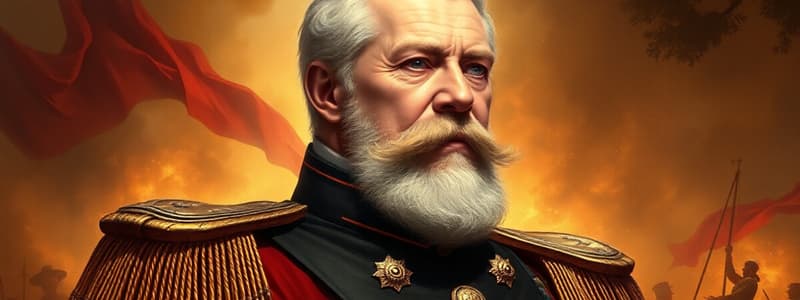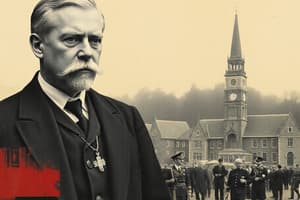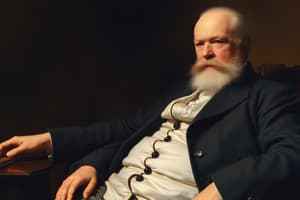Podcast
Questions and Answers
Match the historical figures with their roles in the unification of Germany.
Match the historical figures with their roles in the unification of Germany.
King Wilhelm I = Sought to unify the German states under Prussian rule. Otto von Bismarck = Masterminded the strategy to unify Germany through 'blood and iron'. Liberals in Prussia = Initially sought unification through negotiation with Austria. Leaders of the Holy Roman Empire = Presided over a fragmented collection of German states.
Match the wars with their significance in Bismarck's plan to unify Germany.
Match the wars with their significance in Bismarck's plan to unify Germany.
Austro-Prussian War (1866) = Resulted in Prussia's victory and the exclusion of Austria from German affairs. Franco-Prussian War (1870-1871) = Led to the defeat of France and the unification of German states under Prussian leadership. Crimean War (1853-1856) = Not directly related to Bismarck's unification plan Napoleonic Wars (1803-1815) = Created the German Confederation which attempted to unite German states
Match the concepts with their role or description within the context of German unification.
Match the concepts with their role or description within the context of German unification.
Blood and Iron = Bismarck’s policy of using military strength to achieve German unification. German Confederation = A loose political association aimed at uniting German states after 1815. Minister-President = The title held by Bismarck that allowed him to control the Prussian government Second French Empire = Collapsed following defeat in Franco-Prussian War, indirectly aiding German Unification.
Match each political faction with their primary stance on German unification in the mid-19th century.
Match each political faction with their primary stance on German unification in the mid-19th century.
Match the following territories/political entities with their role in the process of German Unification
Match the following territories/political entities with their role in the process of German Unification
Match each figure with the appropriate achievement during German Unification
Match each figure with the appropriate achievement during German Unification
Match each concept with its description.
Match each concept with its description.
Match consequences with each war
Match consequences with each war
Match each element to its purpose in the Unification of Germany.
Match each element to its purpose in the Unification of Germany.
Match motivations to Political Entities
Match motivations to Political Entities
Flashcards
Holy Roman Empire (HRE)
Holy Roman Empire (HRE)
A multi-ethnic political entity with hundreds of smaller states, with Germany at its heart.
German Confederation
German Confederation
An alliance formed in 1815 to unite German-speaking states, and balance Prussia and Austria.
King Wilhelm I
King Wilhelm I
King of Prussia who aimed to unite German states under Prussian rule.
Otto von Bismarck
Otto von Bismarck
Signup and view all the flashcards
"Blood and Iron"
"Blood and Iron"
Signup and view all the flashcards
Seven Weeks' War
Seven Weeks' War
Signup and view all the flashcards
Franco-Prussian War
Franco-Prussian War
Signup and view all the flashcards
Study Notes
- For almost a thousand years, Germany was the center of the multi-ethnic Holy Roman Empire (HRE).
- The HRE was a collection of hundreds of smaller states.
- In 1815, Europe created a confederation to unite the many German-speaking states.
- The confederation was designed to limit the power of Prussia and the Austrian Empire by balancing them against each other.
- King Wilhelm I of Prussia wanted to unify the German states under Prussian rule, but the Parliament opposed the war.
- Wilhelm appointed Otto von Bismarck as Minister-President.
- When parliament opposed him, Bismarck ignored parliament.
- Bismarck expanded and reformed the military and consolidated the king's control of the army.
- Conservatives and liberals in Prussia wanted a unified German nation-state.
- Many liberals wanted to achieve this through negotiations with Austria, but Bismarck wanted a Germany free of Austrian influence.
- Bismarck stated that Prussia's borders would not be secured through speeches "but by blood and iron."
- Bismarck wanted war to exclude Austrian influence from Germany.
- Prussia attacked Austria, winning in just seven weeks.
- Bismarck needed another war against France to create a unified Germany.
- Bismarck tricked France into starting the war.
- The Prussian army defeated the French in four weeks, and the Second French Empire collapsed.
Studying That Suits You
Use AI to generate personalized quizzes and flashcards to suit your learning preferences.




